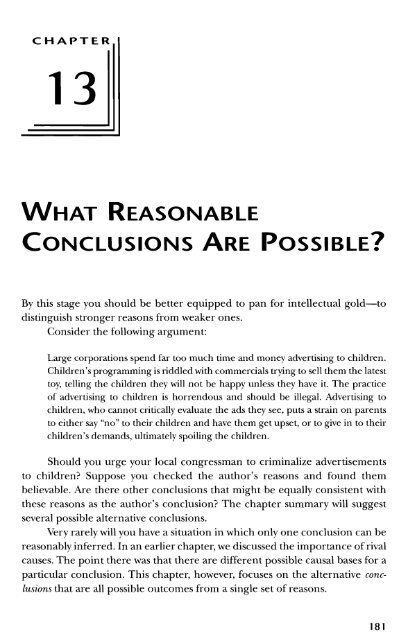Asking the Right Questions, A Guide to Critical Thinking, 8th Ed
Asking the Right Questions, A Guide to Critical Thinking, 8th Ed
Asking the Right Questions, A Guide to Critical Thinking, 8th Ed
Create successful ePaper yourself
Turn your PDF publications into a flip-book with our unique Google optimized e-Paper software.
CHAPTER<br />
13<br />
WHAT REASONABLE<br />
CONCLUSIONS ARE POSSIBLE?<br />
By this stage you should be better equipped <strong>to</strong> pan for intellectual gold—<strong>to</strong><br />
distinguish stronger reasons from weaker ones.<br />
Consider <strong>the</strong> following argument:<br />
Large corporations spend far <strong>to</strong>o much time and money advertising <strong>to</strong> children.<br />
Children's programming is riddled with commercials trying <strong>to</strong> sell <strong>the</strong>m <strong>the</strong> latest<br />
<strong>to</strong>y, telling <strong>the</strong> children <strong>the</strong>y will not be happy unless <strong>the</strong>y have it. The practice<br />
of advertising <strong>to</strong> children is horrendous and should be illegal. Advertising <strong>to</strong><br />
children, who cannot critically evaluate <strong>the</strong> ads <strong>the</strong>y see, puts a strain on parents<br />
<strong>to</strong> ei<strong>the</strong>r say "no" <strong>to</strong> <strong>the</strong>ir children and have <strong>the</strong>m get upset, or <strong>to</strong> give in <strong>to</strong> <strong>the</strong>ir<br />
children's demands, ultimately spoiling <strong>the</strong> children.<br />
Should you urge your local congressman <strong>to</strong> criminalize advertisements<br />
<strong>to</strong> children? Suppose you checked <strong>the</strong> author's reasons and found <strong>the</strong>m<br />
believable. Are <strong>the</strong>re o<strong>the</strong>r conclusions that might be equally consistent with<br />
<strong>the</strong>se reasons as <strong>the</strong> author's conclusion? The chapter summary will suggest<br />
several possible alternative conclusions.<br />
Very rarely will you have a situation in which only one conclusion can be<br />
reasonably inferred. In an earlier chapter, we discussed <strong>the</strong> importance of rival<br />
causes. The point <strong>the</strong>re was that <strong>the</strong>re are different possible causal bases for a<br />
particular conclusion. This chapter, however, focuses on <strong>the</strong> alternative conclusions<br />
that are all possible outcomes from a single set of reasons.<br />
181



